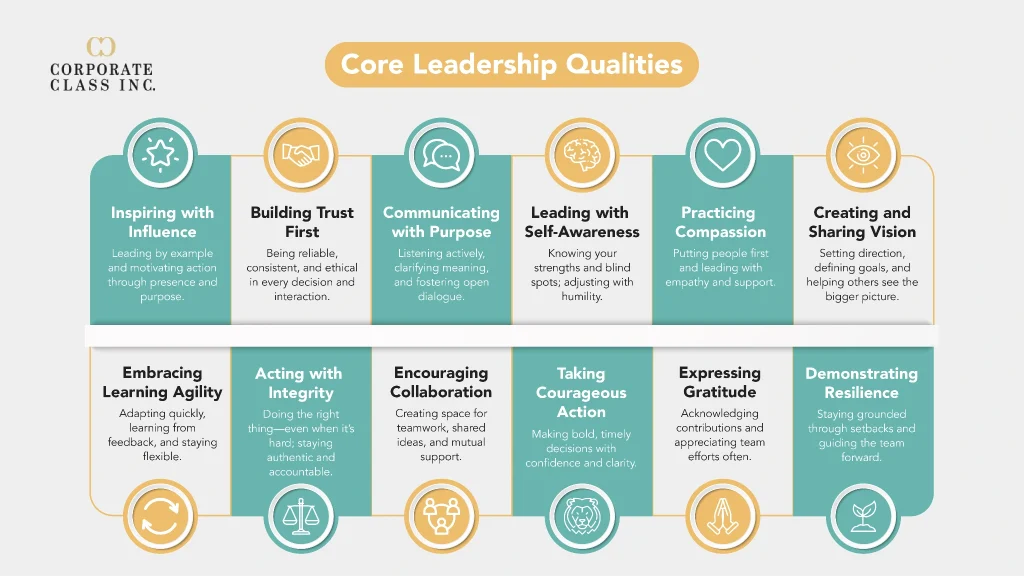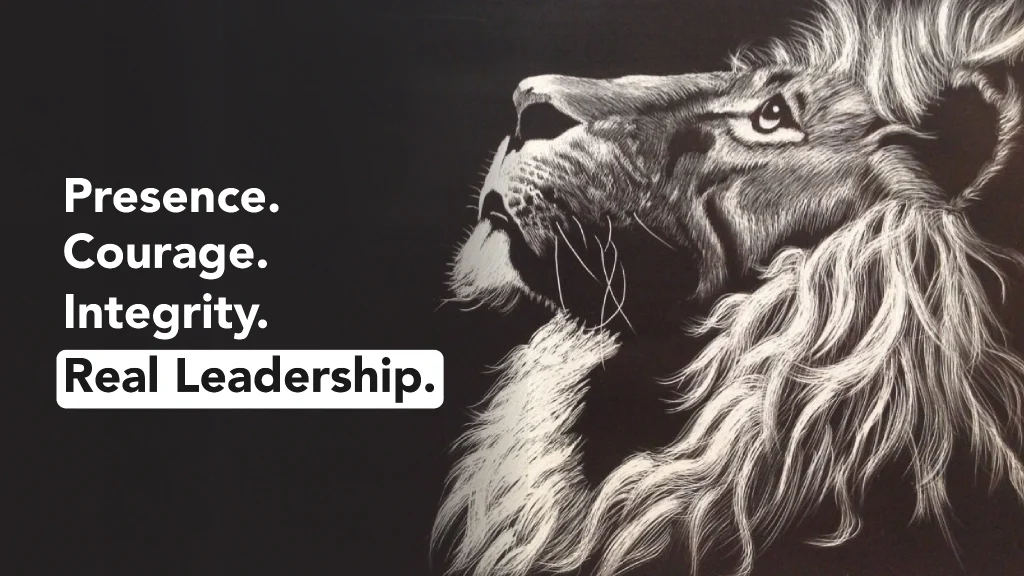The best leaders consistently demonstrate a clear set of qualities, vision, integrity, empathy, and the ability to inspire others.
Great leadership isn’t about titles or authority; it’s about how you show up, make decisions, and bring out the best in those around you. While some people seem naturally gifted, the truth is that good leadership comes down to cultivating specific traits that drive trust, motivation, and results. Let’s break down what truly sets effective leaders apart.
Key Takeaways
- Great leaders practice influence, trust-building, and clear communication to lead with purpose and presence.
- Leadership is grounded in values like integrity, compassion, vision, and the ability to adapt and grow.
- Daily habits, like reflecting, listening, and leading by example, shape leadership strength over time.
Qualities of a Good Leader You Should Practice
A good leader isn’t just someone who holds a title; it’s someone who earns the trust, respect, and commitment of their team. Strong leaders show up with purpose, consistency, and the ability to influence positive outcomes. If you’re aiming to lead well, start by practicing these essential qualities:

Inspiring with Influence
Strong leaders influence by example. They speak with clarity, act with confidence, and drive others to care about the mission. Inspiration isn’t forced, it’s felt. Motivating teams to take ownership and stay committed to shared goals starts with modelling the behaviours you want to see.
Building Trust First
Trust is the foundation of all leadership. People follow leaders they believe in. Focus on being reliable, transparent, and consistent. Great leaders don’t just command respect, they earn it by showing integrity, making ethical decisions, and putting people first.
Communicating with Purpose
Effective communication means listening more than speaking. Leaders ask questions, clarify meaning, and ensure everyone feels heard. By creating an open dialogue, they keep teams aligned and energized.
Creating Strong First Impressions
Leaders understand that presence matters. From posture and tone to attire and energy, how you show up sets the tone for how people perceive your authority. Strong first impressions aren’t about perfection; they’re about authenticity and composure.
Leading with Self-Awareness
Being self-aware means knowing your strengths, recognizing your blind spots, and staying grounded under pressure. Self-aware leaders don’t pretend to know everything. They listen, learn, and adjust their approach when needed.
Showing Respect Consistently
Respect isn’t just about being polite. It’s about recognizing every team member’s value and contributions. Leaders who show respect create safe, inclusive environments where people can speak up, share ideas, and thrive.
Practicing Compassion
Leaders show compassion by prioritizing people over processes. They check in, offer support, and lead with empathy. Compassionate leadership builds loyalty, encourages well-being, and creates stronger teams.
Creating and Sharing Vision
Great leaders know where they’re going, and help others see it too. They set clear goals, communicate direction, and keep the bigger picture in view, even when things get tough. Vision gives people purpose and momentum.
Embracing Learning Agility
Good leaders never stop learning. They welcome feedback, adapt to change, and grow with experience. By staying open and flexible, they guide their teams through challenges and lead with relevance.
Encouraging Collaboration
Collaboration is more than just teamwork. It’s about creating space for others to contribute and grow. Leaders who encourage collaboration make room for ideas, remove barriers, and share credit generously.
Acting with Integrity
Integrity means doing the right thing, even when it’s hard. Leaders with integrity follow through on their promises, own their mistakes, and lead with honesty. This creates a culture where people trust the process and the person leading it.
Taking Courageous Action
Courage is the willingness to face uncertainty and make bold choices. Leaders take responsibility, speak the truth, and advocate for what’s best for the team. Courage drives progress and sets true leaders apart.
Expressing Gratitude
Gratitude fuels morale. Leaders who express thanks build stronger connections and inspire continued effort. A simple “thank you” can increase engagement and show that every contribution matters.
Demonstrating Resilience
Leaders stay steady during hard times. They bounce back, learn from failure, and keep the team focused on progress. Resilience isn’t about avoiding setbacks; it’s about leading through them with strength and clarity.
Developing Leadership Through Daily Habits
Leadership isn’t built in a day. It’s shaped by the small, consistent actions you take every day, how you show up, how you react, and how you grow. Strong leaders develop their skills through habits that reflect their values and commitment to their team’s success.
- Reflecting regularly: Review your actions and decisions to identify what worked, what didn’t, and how you impacted others.
- Practicing intentional listening: Let others speak fully before responding to build trust and improve communication.
- Giving consistent feedback: Share praise and constructive input regularly to support growth and clarify expectations.
- Leading by example: Show the behavior you expect, be punctual, reliable, and respectful at all times.
- Staying curious and teachable: Keep learning through reading, feedback, and staying open to new ideas.
FAQ
What Are The Most Important Qualities Of A Good Leader?
Strong leaders embody trustworthiness, integrity, empathy, communication, and a clear vision that guides their team forward. These qualities help them make ethical decisions, build lasting relationships, and foster an environment where people feel safe, heard, and motivated to do their best work.
How Can I Start Practicing Leadership In My Current Role?
Begin by listening actively, taking initiative, being accountable, and supporting your peers. Offer help before it’s asked for, and seek feedback regularly. Even without a title, you can lead by creating positive momentum, solving problems, and encouraging collaboration within your team.
Why Do Some Leaders Struggle To Gain Respect From Their Teams?
Lack of consistency, unclear communication, and failure to show respect or empathy are common reasons leaders lose trust and respect. When leaders focus too much on authority instead of relationships, they disconnect from their team. Respect is earned through humility, follow-through, and genuine care for the people you lead.
Final Thoughts: Lead With Intention, Not Just Position
Leadership isn’t something you wait to earn, it’s something you practice every day. Even if you’re managing a team or contributing individually, your ability to lead with empathy, clarity, and purpose can transform outcomes. Leadership isn’t about being in charge. It’s about taking responsibility, lifting others, and creating progress.
The best leaders don’t have all the answers, but they are committed to learning, evolving, and showing up for their people. If you want to grow as a leader, start by working on the traits outlined in this guide. Then commit to applying them consistently, not just when it’s easy, but especially when it’s not.
Ready to Become the Leader Others Want to Follow?
Learn how to strengthen your leadership style with practical tools, expert advice, and guided reflection.





